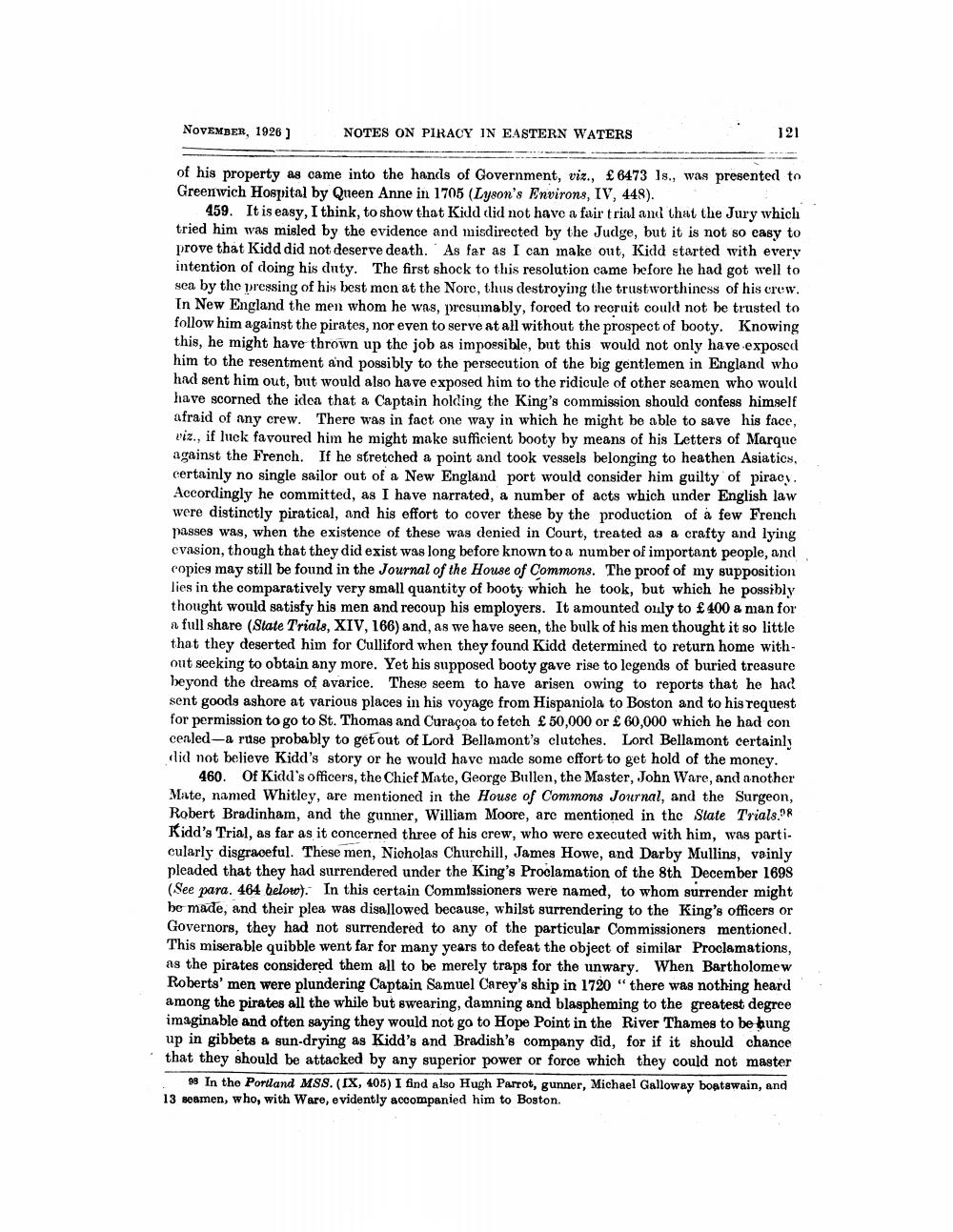________________
NOVEMBER, 1926)
NOTES ON PIRACY IN EASTERN WATERS
.
121
of his property as came into the hands of Government, viz., £ 6473 Is., was presented to Greenwich Hospital by Queen Anne in 1705 (Lyson's Environs, IV, 448).
459. It is easy, I think, to show that Kidd did not have a fair trial and that the Jury which tried him was misled by the evidence and misdirected by the Judge, but it is not so easy to prove that Kidd did not deserve death. As far as I can make out, Kidd started with every intention of doing his duty. The first shock to this resolution came before he had got well to sea by the pressing of his best mon at the Nore, thus destroying the trustworthiness of his crew. In New England the men whom he was, presumably, forced to recruit could not be trusted to follow him against the pirates, nor even to serve at all without the prospect of booty. Knowing this, he might have thrown up the job as impossible, but this would not only have exposed him to the resentment and possibly to the persecution of the big gentlemen in England who had sent him out, but would also have exposed him to the ridicule of other seamen who wouldl have scorned the idea that a Captain holding the King's commission should confess himself afraid of any crew. There was in fact one way in which he might be able to save his face, viz., if luck favoured him he might make sufficient booty by means of his Letters of Marque against the French. If he stretched a point and took Vessels belonging to heathen Asiatics, certainly no single sailor out of a New England port would consider him guilty of piracy. Accordingly he committed, as I have narrated, a number of acts which under English law were distinctly piratical, and his effort to cover these by the production of a few French passes was, when the existence of these was denied in Court, treated as a crafty and lying evasion, though that they did exist was long before known to a number of important people, and copies may still be found in the Journal of the House of Commons. The proof of my supposition lies in the comparatively very small quantity of booty which he took, but which he possibly thought would satisfy his men and recoup his employers. It amounted only to $400 a man for a full share (State Trials, XIV, 166) and, as we have seen, the bulk of his men thought it so little that they deserted him for Culliford when they found Kidd determined to return home without seeking to obtain any more. Yet his supposed booty gave rise to legends of buried treasure beyond the dreams of avarice. These seem to have arisen owing to reports that he had sent goods ashore at various places in his voyage from Hispaniola to Boston and to his request for permission to go to St. Thomas and Curaçoa to fetch £50,000 or £60,000 which he had con cealed-a ruse probably to get out of Lord Bellamont's clutches. Lord Bellamont certainly did not believe Kidd's story or he would have made some effort to get hold of the money.
460. Of Kidd's officers, the Chief Mate, George Bullen, the Master, John Ware, and another Mate, named Whitley, are mentioned in the House of Commons Journal, and the Surgeon, Robert Bradinham, and the gunner, William Moore, are mentioned in the State Trials." Kidd's Trial, as far as it concerned three of his crew, who were executed with him, was parti. cularly disgraceful. These men, Nicholas Churchill, James Howe, and Darby Mullins, voinly pleaded that they had surrendered under the King's Proclamation of the 8th December 1698 (See para. 464 below). In this certain Commissioners were named, to whom surrender might be made, and their plea was disallowed because, whilst surrendering to the King's officers or Governors, they had not surrendered to any of the particular Commissioners mentioned. This miserable quibble went far for many years to defeat the object of similar Proclamations, as the pirates considered them all to be merely traps for the unwary. When Bartholomew Roberts' men were plundering Captain Samuel Carey's ship in 1720 " there was nothing heard among the pirates all the while but swearing, damning and blaspheming to the greatest degree imaginable and often saying they would not go to Hope Point in the River Thames to be hung up in gibbets a sun-drying as Kidd's and Bradish's company did, for if it should chance that they should be attacked by any superior power or force which they could not master
98 In the Portland MSS. (IX, 405) I find also Hugh Parrot, gunner, Michael Galloway boatswain, and 13 soamen, who, with Ware, evidently accompanied him to Boston




